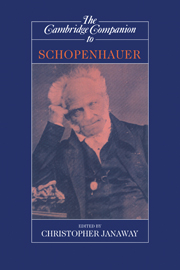Book contents
- Frontmatter
- Introduction
- 1 Schopenhauer on the Self
- 2 Schopenhauer and Knowledge
- 3 The Fourfold Root
- 4 Schopenhauer, Kant, and the Methods of Philosophy
- 5 Will and Nature
- 6 The Influences of Eastern Thought on Schopenhauer’s Doctrine of the Thing-in-Itself
- 7 Ideas and Imagination
- 8 Schopenhauer’s Narrower Sense of Morality
- 9 Schopenhauer on Death
- 10 Schopenhauer’s Pessimism
- 11 Nietzsche, Schopenhauer, and Dionysus
- 12 Schopenhauer, Will, and the Unconscious
- 13 Schopenhauer and Wittgenstein
- Bibliography
- Index
5 - Will and Nature
Published online by Cambridge University Press: 28 May 2006
- Frontmatter
- Introduction
- 1 Schopenhauer on the Self
- 2 Schopenhauer and Knowledge
- 3 The Fourfold Root
- 4 Schopenhauer, Kant, and the Methods of Philosophy
- 5 Will and Nature
- 6 The Influences of Eastern Thought on Schopenhauer’s Doctrine of the Thing-in-Itself
- 7 Ideas and Imagination
- 8 Schopenhauer’s Narrower Sense of Morality
- 9 Schopenhauer on Death
- 10 Schopenhauer’s Pessimism
- 11 Nietzsche, Schopenhauer, and Dionysus
- 12 Schopenhauer, Will, and the Unconscious
- 13 Schopenhauer and Wittgenstein
- Bibliography
- Index
Summary
A recent short entry on 'will' in The Oxford Companion to Philosophy uses one-tenth of its word length to inform us that 'the will reached its philosophical apotheosis in Schopenhauer's The World as Will and Idea (1818, 1844)'. This is correct insofar as the central term of that work's account of human nature, and of the nature of the whole world, is Wille, a word we can translate only as will. But it is apt to mislead. For in the history of the concept of will, Schopenhauer's intervention is idiosyncratic and perturbing. He does not simply take a pre-existing conception and give it an unwonted importance; he takes the word Wille and proposes for it a use that is revolutionary and far from straightforward.
WILL AND ‘THE RIDDLE’
Will makes its dramatic debut in Schopenhauer’s main work in §18 after a well-orchestrated build-up that allows it to be presented as ‘the answer’ to a tantalizing and vital riddle. The First Book of The World as Will and Representation has given a systematic account of the world of objects. Objects are objects of experience for a representing subject: there can be no object without subject, no subject without object. Objects are organized by space, time, and causality, the a priori forms of all representation. The subject perceives or has ‘intuitive representations’ and, using concepts, it thinks, reasons, and judges. Throughout all this its representations are ordered, each representation being grounded in others in accordance with the principle of sufficient reason in one of its four versions. But something is missing from this orderly scenario.
- Type
- Chapter
- Information
- The Cambridge Companion to Schopenhauer , pp. 138 - 170Publisher: Cambridge University PressPrint publication year: 1999
- 5
- Cited by



